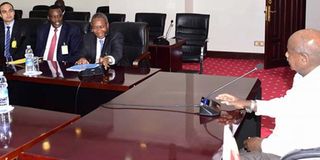Museveni, World Bank agree to start talks on lowering cost for Bujagali power

President Museveni yesterday met with a team of the International Finance Corporation, a member of the World Bank Group. Cheikh Oumar Seydi, the regional director Eastern and Southern Africa, led the group. COURTESY PHOTO
What you need to know:
- Power from the dam is currently more expensive compared to power generated from from Kiira and Nalubaale hydropower dams.
- Recently, there has been corridor talk about the possibility of government buying the dam, however, senior officials in the ministry of Finance in a recent interview with this newspaper disowned the proposal.
KAMPALA. President Museveni and a team from World Bank’s International Finance Corporation (IFC), have agreed to further discussions on the prospects of lowering the cost of power generated at Bujagali dam from the current $0.113 (Shs411) per unit to at least $0.05 (Shs182).
The resolution was reached yesterday during a meeting at State House in Entebbe between the President and a team led by IFC’s regional director for East and Southern Africa Cheikh Oumar, according to a statement posted on social media by senior presidential press secretary Don Wanyama. IFC is an arm of the World Bank Group that offers investment, advisory, and asset management services to encourage private sector development in developing countries.
“An array of issues was discussed but key being the cost of power from Bujagali that is priced at 11.3 US cents per unit. The President indicated that this price was exorbitant and was hampering the country's industrialisation drive,” the statement read in part.
Located on the River Nile near Jinja, the 25Omw dam is owned by Bujagali Energy Ltd (BEL), a special-purpose vehicle owned in turn by Industrial Promotion Services, which is part of the Aga Khan Fund for Economic Development, and SG Bujagali Holdings, an affiliate of Sithe Global Power, LLC, part of Blackstone, the US-based private-equity fund. IFC was one of the key funders of the project.
The government holds a 4.63 per cent stake in BEL, which has a 30-year build-own-operate-transfer concession over the dam.
For several months now, since the dam was commissioned in 2012, President Museveni has repeatedly complained about the tariffs offered by BEL. In his State-of-the-Nation address for 2015 he said these exorbitant tariffs had distorted electricity prices in the country.
Power from the dam is currently more expensive compared to power generated from from Kiira and Nalubaale hydropower dams.
Recently, there has been corridor talk about the possibility of government buying the dam, however, senior officials in the ministry of Finance in a recent interview with this newspaper disowned the proposal.
Construction of the project was completed in July 2012 and began operations in October 2012. It consists of five 50MW turbines. The project cost estimate was revised from $530m (Shs1.9 trillion) to $900m (Shs3.3 trillion) .



